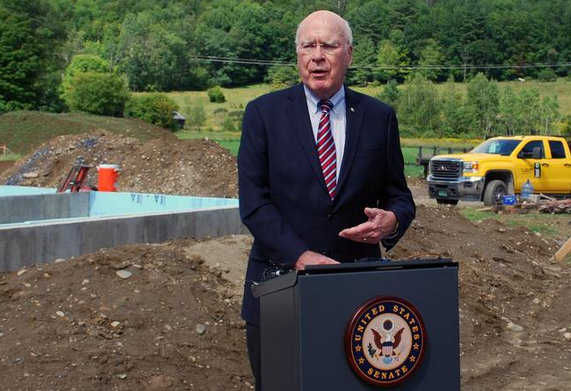Leahy, Murray And Welch Reintroduce Legislation To Curtail Warrantless Vehicle Checkpoint Stops And Property Searches Away From The Border
. . . Amends The So-Called 100-Mile “Border Zone” To Limit DHS Vehicle Stops And Warrantless Searches Of People And Property
WASHINGTON (FRIDAY, July 19, 2019) – U.S. Senators Patrick Leahy (D-Vt.) and Patty Murray (D-Wash.) late Thursday reintroduced their legislation to strengthen privacy protections in the United States by limiting the unreasonably large “border zone.” Representative Peter Welch (D-Vt.) introduced an identical version of the bill in the House of Representatives.
Customs and Border Protection (CBP) officers currently have broad legal authority to stop vehicles without a warrant or even reasonable suspicion of wrongdoing within 100 miles of the border, and to search private land within 25 miles of the border. The 100-mile “border zone” covers a geographic area that includes nearly two-thirds of the population of the United States, including all or virtually all of Florida, Maine, New Hampshire, Massachusetts, Connecticut, New Jersey, and Delaware, along with non-border cities such as Portland, Ore., Spokane, Wash., and even Richmond, Va.
Recently, CBP agents in Vermont set up a checkpoint in South Hero, Vt., miles from the Canadian border. Border Patrol has set up checkpoints along roads in other parts of New England, but this was the first time since 2009 that a checkpoint had been established inland from the international border in Vermont. That checkpoint led to no arrests or property seizures. A second checkpoint in the same location last month resulted in nearly 900 vehicles being stopped and only one arrest, for a visa overstay. Last year, CBP agents asked Amtrak train passengers about their citizenship in White River Junction, Vt., and on separate occasions have boarded Greyhound buses in Spokane, Wash., and at the Burlington, Vt., airport to ask passengers about their citizenship.
The lawmakers note that such an expansive “border zone” raises grave constitutional concerns. And they point out that at a time when CBP is struggling to handle a humanitarian crisis along the Southern border, these ineffective checkpoints are a “terrible” use of resources.
This legislation would reduce the “border zone” from 100 miles to 25 miles in which DHS may make vehicle stops and searches, and from 25 miles to 10 miles for DHS access to private property.
This bill is supported by the American Civil Liberties Union.
Leahy said: “‘Show me your papers’ are words that you should never hear once inside the United States. Unless a government agent has a legitimate reason to stop and search you — a reasonable suspicion or probable cause — Americans should not be subject to questioning and detention for merely going about their daily lives. The Trump administration cannot be trusted to use its finite resources in a way that protects our civil liberties and reflects our values. Conducting aggressive and far-reaching ‘border zone’ searches of Americans while there is a humanitarian crisis at our southern border is the wrong choice. This commonsense legislation would require that the Trump administration do better.”
Murray said: “No person deserves to be hassled or detained simply because they live or travel near our borders — not in Washington State, or any state in our country. This bill would protect the rights of families and communities who happen to live or travel near our national borders, while still allowing federal law enforcement to do their jobs and keep our borders safe.”
Welch said: “We must strike a better balance between protecting our national security and preserving our constitutional rights. A 100-mile unfettered enforcement zone is overly broad and unduly restricts the constitutional rights to privacy and protection against warrantless searches of millions of Americans living in this zone. This commonsense legislation will enable authorities to conduct the important work of protecting our borders while protecting our civil liberties.”
The full text of the legislation is available here. A fact sheet on the legislation is available here.
# # # # #
CONTACT:
David Carle (w/Leahy), 202-224-3693
Michael Brewer (w/Murray), 202-224-2834
Lincoln Peek (w/Welch), 202-440-3340
Press Contact
David Carle: 202-224-3693

